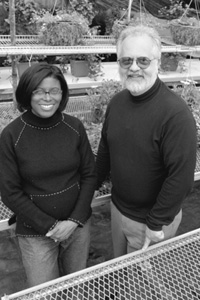 |
|
||
|
|||
Boosting business, building community
InnerCity Entrepreneurs gives small businesses a shot at the big leagues
By David J. Craig
|
|
|
|
Gillian Isabelle, the owner of the Roslindale greenhouse Edenscapes, is one of 14 small business owners participating in InnerCity Entrepreneurs, a technical training and networking program created by Dan Monti, a CAS sociology professor (right). Photo by Frank Curran |
|
In the eight years since Roosevelt St. Louis launched Nouvelle Creation Catering, the Mattapan business has expanded from a two-person to a seven-person operation and become a leader in its field — catering of Caribbean and African-American style food.
But Nouvelle Creation recently hit a wall. St. Louis, who has no formal business training and few well-connected friends, was finding it difficult to fully capitalize on the market represented by the local minority community.
“My goal is to be the first professional, on-site catering facility in Boston that specializes in Caribbean and Southern cuisine,” says St. Louis. “The biggest challenge I face is that when people hear about us, they assume that the quality of our food must be low, because top-quality catering for ethnic cuisine is uncommon. Expanding my business right now is going to require that I do a lot of social networking to get the word out.”
It was to assist business owners like St. Louis that Daniel Monti, a CAS sociology professor, and Andrew Wolk, an SMG research associate, recently launched InnerCity Entrepreneurs (ICE). A collaboration between the CAS sociology department, BU's Entrepreneurial Management Institute, and Roxbury Community College's Small Business Development Institute, ICE provides educational and networking resources to minority and inner city business owners, with an eye toward helping them break into the city's larger business networks and at the same time strengthen their communities. It's supported by a $100,000 grant from Citizens Bank Foundation.
“There's a lot of technical assistance available out there for start-ups, but virtually nothing for established businesses that want to grow,” says Monti. “We want to find owners of small businesses who have passed the three- to five-year survival test, train them in how to grow their business, and put them in the same room so that by reaching a hand across the table, they can extend their markets.”
So starting in January, St. Louis and 13 other business owners from around Boston have been attending a three-hour course at BU every two weeks that teaches skills in areas such as financial management, cost analysis, hiring and training, and goal-setting. Participants are required to create a three-year growth plan and during the yearlong course complete assignments that evaluate various aspects of their performance. They also agree to take part in a five-year panel study, headed by Monti, on the factors that enable small businesses in the inner city to grow, and the ways that the growth of businesses contributes to the vitality of inner city communities, particularly by producing business leaders who become civic leaders.
“The course work gets the participants to step back and analyze their businesses in ways that most small business owners don't usually find the time to do,” says Wolk, who directs ICE and teaches the course. “Its very interactive in that the participants use their own businesses as case studies, test out in their business what they learn in the course, and then come back and talk about it. The course has essentially become a part of their job now.”
ICE also has developed a group of private industry experts from fields such as law, accounting, banking, equity financing, human resources, and real estate, who serve as guest speakers in the course and are available to answer the business owners' questions and help them network.
Growing a greenhouse
Gillian Isabelle, the owner of Edenscapes, a Roslindale wholesale greenhouse, says the course has helped her make basic business decisions more systematically. A first-time business owner with a background in engineering, she took over the 25-year-old Edenscapes last year from an owner who had let annual sales drop to about $125,000.
“One assignment I found extremely helpful was analyzing my financial performance,” says Isabelle. “That included taking my income statements and figuring out what are the key financial measures that I should track constantly. I've tried to do that in the past, but I'm doing it in more sophisticated ways now, by comparing my performance to industry standards and using equations I didn't know about before.”
St. Louis says that so far he's benefited from ICE primarily through the new contacts he's made — he currently is discussing collaborating with several others taking the course, including Isabelle, and has been introduced to deep-pocketed investors by another ICE participant, Bob Katz, owner of the multimillion-dollar operation My Grandma's Coffee Cake of New England.
According to Monti, who says the idea for ICE stems from research he completed for his 1999 book American City, among the most revealing aspects of the project will be how its participants improve not just their businesses, but their neighborhoods.
“History has taught us that two important ways of building community in America is how businesspeople do it, and how members of ethnic groups do it,” he says. “Those two strategies are very different, but I believe they can be complementary, and by combining them, ICE is trying to jump-start that entire community-building process. Business leaders tend to be very engaged in the community, in ways that most people don't observe. And in a city like Boston, which is perceived as being not particularly nurturing to new immigrant groups, the newer populations, such as the blacks, Latinos, and Asians, are going to be more successful economically, and culturally, if they learn to work together.”
For more information about ICE, visit www.bu.edu/ice.
![]()
2
April 2004
Boston University
Office of University Relations
